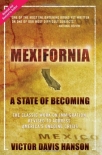Mexifornia: A State of Becoming Victor Hanson (best pdf ebook reader TXT) 📖

- Author: Victor Hanson
Book online «Mexifornia: A State of Becoming Victor Hanson (best pdf ebook reader TXT) 📖». Author Victor Hanson
Whatever we are doing wrong in our California schools, it is not, as popular myth suggests, a result of doing nothing. If anything, the problem is one of frenzied activity - almost always of the wrong kind. Our bankrupt state at great cost, in loco parentis, has taken up the task of turning thousands of children of illegal aliens and resident immigrants into familiar mall kids with Valley-girl accents, cell phones and Old Navy T-shirts, who rightly should not have to cut grass and pick grapes like their grandparents and parents. They are given every sort of counseling, pep talk, grievance boilerplate - everything but a real education that might allow them to compete with native Californians. How strange that we give minority children billions of dollars in extra aid and education that brings them almost no real scholarly preparation, but a lot of resentment among those taxpayers who subsidize it.
I have reached the point where I now believe that the military would do a better job than we in the university do with young people of all backgrounds. I note that Mexican-American - and all other - students who enter our classes after four years of military service are far better educated and disciplined than their peers of similar age. They are reluctant to waste a penny of their hard-earned education benefits, which is not true of others who have grants lavished on them because of their ethnic heritage and the modesty of their parents' income. Many good-thinking liberals worry about the exorbitant $400 billion that will soon be allotted for defense expenditures; but they fail to investigate how much of such funds are spent on salaries and training - manpower rather than just hardware. In contrast, few are concerned how much capital is provided to our universities, both by state and federal agencies, that not merely fails to ensure real education or even reasonable graduation rates, but in fact may do far more harm than good by creating a sense of victimhood and a reliance on government largess.
Not far away from my farm, in the Central Valley town of Parher, there are entire tracts of three-bedroom, two-bath houses available with federal assistance to recent immigrants. A new health center is blocks away. None of this subsidy was provided by local municipal funds. Indeed, the city government - plagued by constant corruption, recall elections and tribalism - is little more than a ward of the federal government. (Policing was for years taken over by the county.) The town is 99 percent Mexican or Mexican-American, often broke, and dependent upon state and federal money for almost all of its services. And yet it has nice streets, homes, clinics and schools.
So America really is endeavoring to level the playing field in one era, rather than in the traditional three generations of past immigrant experience, as it feverishly tries to meet ever-rising expectations. Nineteenth-century Italian families may have taken sixty or more years to achieve economic equity with WASPs, but America has now unleashed its creativity and enormous powers of production to attempt to reduce that race for absolute parity to a decade or two. Anything less, we are told, and our society is failing, racist or pathological.
African-Americans, of course, resent the Mexican immigrants' development of such a sense of entitlement, and make a good case that the wages of their own youths' entry-level jobs are permanently depressed because of cheap alien labor. They also feel that the increasing desirability of bilingual skills for mid-level state government employment is simply another roadblock for their own advancement. Asians are bewildered by our state's labyrinth of contradictory laws and subsidies. The older Asian generation scoffs at the need for any special state aid when one can open a donut shop, stereo store, auto shop or accounting firm - even as their highly educated and often professionally employed children vaguely sense that a system of racial spoils, in fact, might prove advantageous to themselves.
The new ethnic argument for massive government help to the less fortunate is perhaps most troubling to aging white Californians of Oklahoma extraction, the millions who drove into the state from the dire poverty of the Dust Bowl and got very little in housing, aid or education from the state or federal government. Those who work in the race industry allege that the relative success of these onetime Okies after a half-century comes exclusively from "being white." But I am not so sure. Most farmers resented their presence, especially their bothersome accents, culture and religion. I think the





Comments (0)